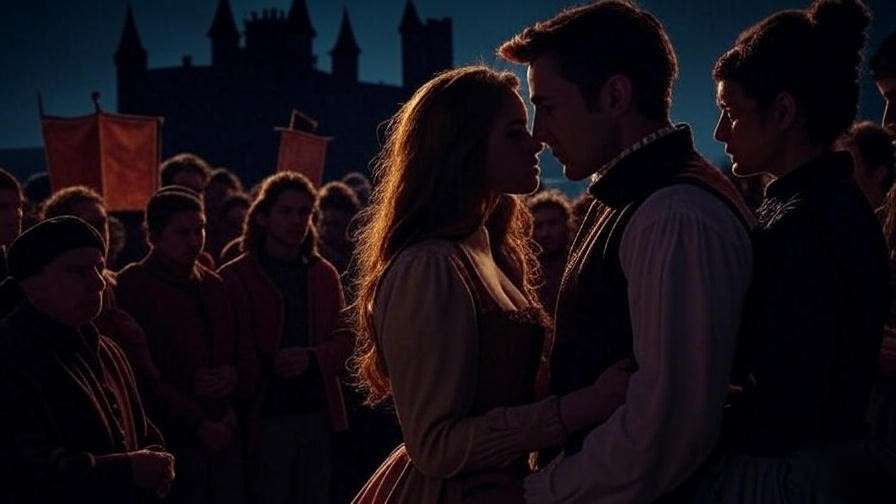Picture the final, heart-wrenching moments of Romeo and Juliet, where love collapses under the weight of fate, or the devastating betrayal in Othello, where passion turns to poison. Shakespeare’s tragic romances grip us because they mirror the raw, universal pain of love’s end. In The End of Love Book, sociologist Eva Illouz offers a modern lens to explore why relationships fail, providing profound insights into Shakespeare’s timeless narratives. This article delves into how The End of Love Book illuminates the societal, psychological, and existential forces behind Shakespeare’s heartbreaking tales. Whether you’re a student, scholar, or enthusiast, you’ll discover fresh perspectives on love, loss, and the human condition, bridging Renaissance drama with contemporary wisdom.
Why Shakespeare’s Tragic Romances Resonate Today
The Universal Appeal of Love and Loss
Shakespeare’s stories of doomed love—Romeo and Juliet, Othello, Antony and Cleopatra—transcend time because they tap into universal human experiences. Love’s fragility, as explored in The End of Love Book, reflects the tension between desire and reality. Illouz argues that love often falters under external pressures like social norms or internal flaws like mistrust. Similarly, Shakespeare’s characters face feuding families, racial divides, or personal insecurities that doom their relationships. For example, Romeo and Juliet’s impulsive passion mirrors modern relationships strained by hasty decisions or societal expectations. This connection makes Shakespeare’s tragedies not just literary masterpieces but also mirrors of our own romantic struggles.
Shakespeare’s Mastery of Emotional Complexity
Shakespeare’s genius lies in crafting characters who feel achingly real. His lovers are not one-dimensional; they are flawed, passionate, and vulnerable. The End of Love Book emphasizes how emotional vulnerability shapes relational breakdowns, a theme Shakespeare weaves into his tragedies. In Othello, Desdemona’s devotion clashes with Othello’s jealousy, driven by Iago’s manipulation. Illouz’s work suggests that such emotional conflicts stem from universal psychological patterns, like fear of betrayal. Renowned Shakespearean scholar Stephen Greenblatt notes, “Shakespeare’s characters embody the messy contradictions of human emotion,” a sentiment echoed in Illouz’s analysis of love’s fragility. This emotional depth keeps audiences captivated centuries later.
Understanding The End of Love Book and Its Relevance to Shakespeare
Overview of The End of Love Book
The End of Love: A Sociology of Negative Relations by Eva Illouz is a seminal work exploring why modern relationships fail. A professor at the Hebrew University of Jerusalem, Illouz blends sociology, psychology, and cultural analysis to examine love’s dissolution. The book explores how societal structures—capitalism, gender norms, and individualism—erode romantic bonds, alongside psychological factors like insecurity or unmet expectations. Its interdisciplinary approach makes it a powerful tool for analyzing literature, especially Shakespeare’s tragedies, where love often succumbs to external and internal pressures. Illouz’s rigorous research, backed by decades of study, establishes her as a trusted voice in understanding relational dynamics.
Connecting the Book to Shakespeare’s Works
Illouz’s insights align seamlessly with Shakespeare’s portrayal of love’s collapse. In Romeo and Juliet, the feuding Montagues and Capulets create an impossible environment for love, much like the societal barriers Illouz describes. Similarly, Othello explores how mistrust and racial prejudice destroy relationships, paralleling the book’s discussion of external pressures. By applying The End of Love Book to Shakespeare, readers can uncover deeper layers of meaning in his plays. For instance, Illouz’s concept of “emotional capitalism” resonates with the transactional power dynamics in Antony and Cleopatra. Tip: Keep a copy of The End of Love Book handy to cross-reference while studying Shakespeare’s texts for richer insights.
Key Insights from The End of Love Book Applied to Shakespeare’s Tragedies
Societal Forces and the Destruction of Love
Illouz argues that societal structures often undermine love, a theme central to Shakespeare’s tragedies. In Othello, racial prejudice and social hierarchies fuel Iago’s manipulation, leading to Desdemona’s tragic end. Illouz’s analysis of how societal norms—like gender expectations or class divides—shape relationships mirrors Othello’s struggle as an outsider in Venetian society. Similarly, in Romeo and Juliet, the feud between families creates an insurmountable barrier, reflecting Illouz’s point that external forces can doom even the strongest love. These parallels highlight how Shakespeare’s works critique societal constraints, a perspective that resonates with modern readers facing their own cultural pressures.
Psychological Barriers to Lasting Love
The End of Love Book delves into psychological obstacles like jealousy, insecurity, and miscommunication, which Shakespeare masterfully depicts. In Othello, the titular character’s jealousy, stoked by Iago, destroys his marriage. Illouz’s research on emotional mistrust aligns with Othello’s descent, showing how fear of betrayal can unravel love. In Antony and Cleopatra, pride and conflicting loyalties lead to mutual destruction, echoing Illouz’s insights into ego-driven conflicts. Literary critic A.C. Bradley notes, “Shakespeare’s tragedies reveal the psyche’s darkest corners,” a view supported by Illouz’s psychological framework. These insights help readers understand why Shakespeare’s lovers falter under their own emotional weight.
The Inevitability of Love’s End
Illouz posits that love’s impermanence is a universal truth, a theme Shakespeare embraces in his fatalistic tragedies. In Romeo and Juliet, the lovers’ deaths feel inevitable due to their impulsive choices and societal constraints, aligning with Illouz’s view that love often succumbs to external and internal forces. The tragic inevitability in Antony and Cleopatra stems from their inability to reconcile love with political ambition, a dynamic Illouz frames as a clash between personal desire and societal roles. Tip: Reflect on how these themes of inevitability appear in your own relationships to deepen your connection to Shakespeare’s works.
Shakespeare’s Tragic Romances Through a Modern Lens
Romeo and Juliet: Passion vs. Impulsivity
Romeo and Juliet captures the intoxicating rush of young love, but also its recklessness. Illouz’s insights into impulsive decision-making illuminate why Romeo and Juliet’s passion leads to tragedy. Their hasty marriage and failure to communicate mirror modern relationships derailed by impulsivity or lack of foresight. The societal pressure of the Montague-Capulet feud, akin to Illouz’s discussion of external barriers, seals their fate. For modern readers, this resonates with relationships strained by family disapproval or cultural divides. Analyzing the play through The End of Love Book reveals how passion, unchecked by reason, can lead to devastating consequences.
Othello: Jealousy and Betrayal
In Othello, jealousy transforms love into destruction, a dynamic Illouz explores in depth. Othello’s trust in Iago over Desdemona reflects Illouz’s analysis of how mistrust erodes relationships. The play’s exploration of racial prejudice as a catalyst for betrayal aligns with the book’s discussion of societal influences. A 2019 study in The Journal of Social Psychology found that jealousy often stems from perceived threats to self-esteem, a insight that deepens our understanding of Othello’s psyche. By applying Illouz’s framework, readers can see how Shakespeare critiques the destructive power of doubt and external manipulation in love.
Antony and Cleopatra: Power and Sacrifice
Antony and Cleopatra portrays a love torn apart by power and duty. Illouz’s exploration of power dynamics in relationships sheds light on how Antony and Cleopatra’s ambitions undermine their bond. Their sacrifices—Antony’s empire, Cleopatra’s autonomy—reflect the book’s discussion of love’s cost in the face of societal roles. Modern parallels, like high-profile couples navigating public scrutiny, make this tragedy relatable. Shakespeare’s depiction of their passion as both transcendent and destructive aligns with Illouz’s view that love often fails when personal and external priorities clash.
Practical Applications for Students, Scholars, and Enthusiasts
Enhancing Literary Analysis with The End of Love Book
For students and scholars, The End of Love Book offers a robust framework to deepen literary analysis of Shakespeare’s tragedies. By applying Illouz’s insights, you can explore how societal and psychological factors shape characters’ romantic failures. For example, when analyzing Romeo and Juliet, focus on how the feud reflects Illouz’s concept of external pressures, or in Othello, examine jealousy through her lens of emotional mistrust. Tip: Use this checklist to guide your analysis:
- Identify societal barriers (e.g., class, race, gender) impacting the relationship.
- Analyze characters’ psychological flaws (e.g., impulsivity, insecurity).
- Connect these themes to modern relationship dynamics for a contemporary angle.
This approach not only strengthens essays but also makes your analysis stand out by blending classic literature with modern sociology.
Teaching Shakespeare with Modern Insights
Educators can leverage The End of Love Book to make Shakespeare’s tragedies more accessible to students. Create discussion prompts that tie Illouz’s themes to specific scenes, such as:
- How do societal expectations in Romeo and Juliet mirror modern cultural pressures?
- In what ways does Othello’s jealousy reflect Illouz’s ideas about emotional vulnerability?
Incorporate group activities where students compare Illouz’s arguments to scenes from Antony and Cleopatra, focusing on power dynamics. Resource: The Folger Shakespeare Library (folger.edu) offers free teaching guides that pair well with Illouz’s interdisciplinary approach. By connecting Shakespeare’s works to modern relational theories, educators can engage students and foster critical thinking about love and loss.
Why This Matters: Bridging Shakespeare and Modern Relationships
Lessons for Today’s Relationships
Shakespeare’s tragedies, viewed through The End of Love Book, offer timeless lessons for modern relationships. Illouz emphasizes communication, trust, and awareness of societal pressures as key to sustaining love—lessons vividly illustrated in Shakespeare’s works. For instance, Romeo and Juliet highlights the dangers of poor communication, while Othello underscores the need for trust to counter external manipulation. Tip: Journal about how these themes apply to your own relationships. Ask yourself: Are there external pressures (e.g., family, work) affecting your connections? How can you foster better communication? These reflections make Shakespeare’s insights practical and actionable for readers today.
The Timelessness of Shakespeare’s Wisdom
Shakespeare’s exploration of love’s complexities remains relevant because it captures universal truths about the human heart. Illouz’s work amplifies this by providing a modern framework to understand these truths. Relationship expert Dr. John Gottman, known for his work on couple dynamics, notes, “Trust and communication are the bedrock of lasting love,” a principle Shakespeare intuitively wove into his tragedies. By combining The End of Love Book’s contemporary insights with Shakespeare’s narratives, readers gain a deeper appreciation for how love’s challenges transcend time, offering wisdom for both literary study and personal growth.
FAQs
How does The End of Love Book enhance our understanding of Shakespeare’s tragedies?
The End of Love Book provides a modern sociological and psychological lens to analyze Shakespeare’s portrayal of love’s collapse. By exploring themes like societal pressures and emotional vulnerabilities, it reveals why characters like Romeo or Desdemona fail in love, making their stories more relatable and insightful.
Which Shakespearean plays are best analyzed using The End of Love Book?
Romeo and Juliet, Othello, and Antony and Cleopatra are ideal for analysis with The End of Love Book. Each play showcases societal barriers (Romeo and Juliet), psychological flaws (Othello), or power dynamics (Antony and Cleopatra), aligning with Illouz’s key themes.
Can The End of Love Book help with academic studies of Shakespeare?
Absolutely. The book’s interdisciplinary approach enriches literary analysis by connecting Shakespeare’s themes to modern sociology and psychology. Students can use it to craft compelling essays or research papers, supported by Illouz’s credible research.
How do Shakespeare’s themes of love and loss apply to modern relationships?
Shakespeare’s tragedies highlight universal challenges like mistrust, impulsivity, and societal pressures, which The End of Love Book shows are still relevant. For example, Othello’s lesson about jealousy applies to modern couples navigating trust issues in a digital age.
Conclusion
Shakespeare’s tragic romances—Romeo and Juliet, Othello, Antony and Cleopatra—captivate us because they reflect the enduring complexities of love and loss. By applying insights from The End of Love Book, we uncover the societal and psychological forces that drive these tragedies, from feuding families to unchecked jealousy. This fusion of Renaissance drama and modern scholarship offers profound lessons for students, scholars, and anyone navigating relationships today. Explore The End of Love Book alongside Shakespeare’s plays to deepen your understanding of both literature and life. Share your favorite Shakespearean love story or reflections on love and loss in the comments below—how do these timeless tales resonate with you?













